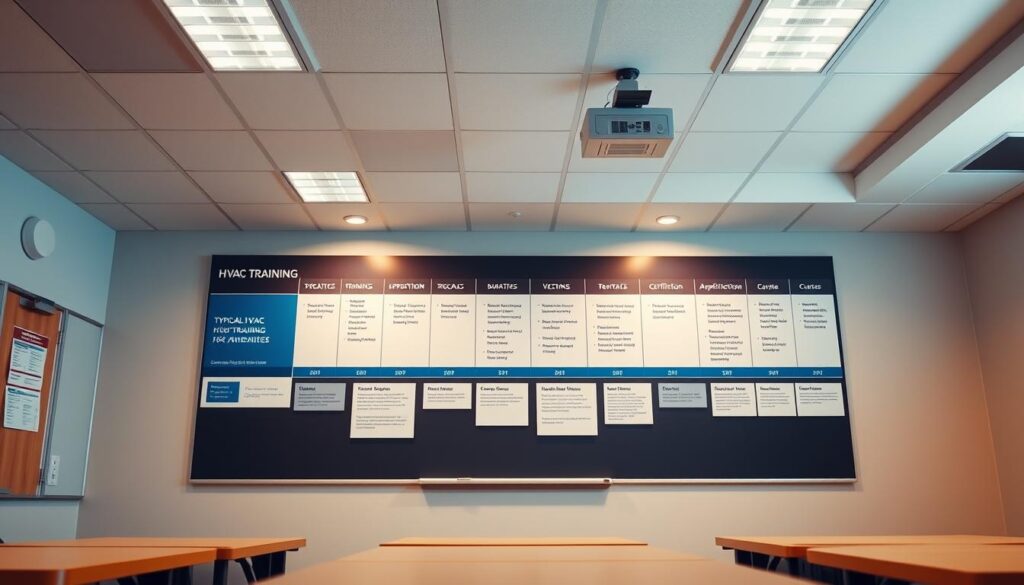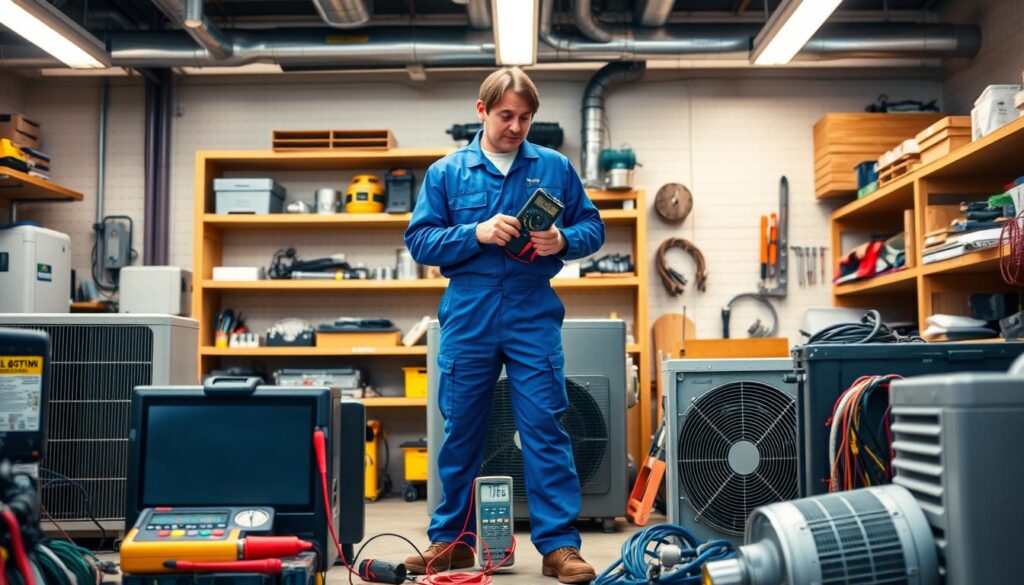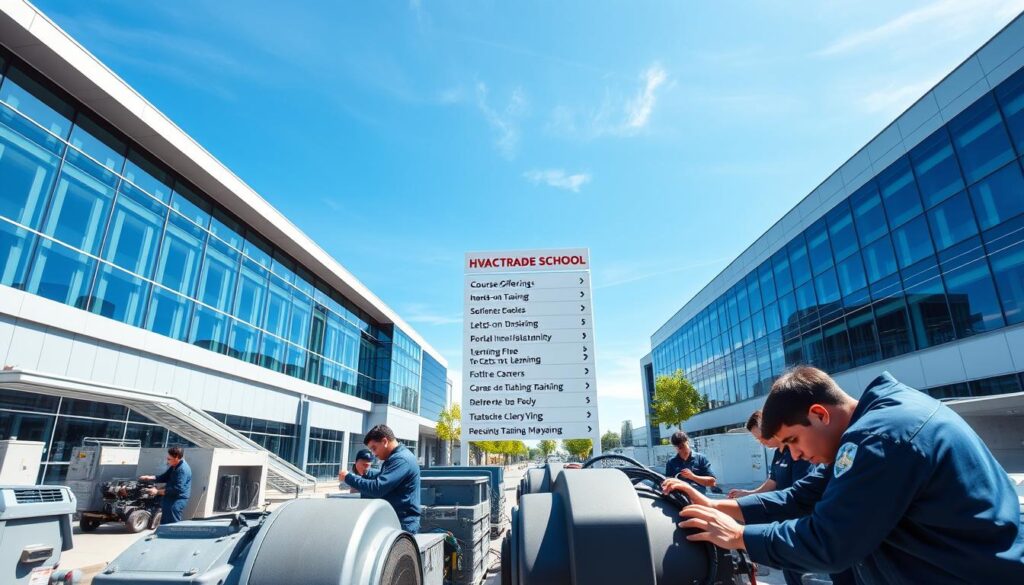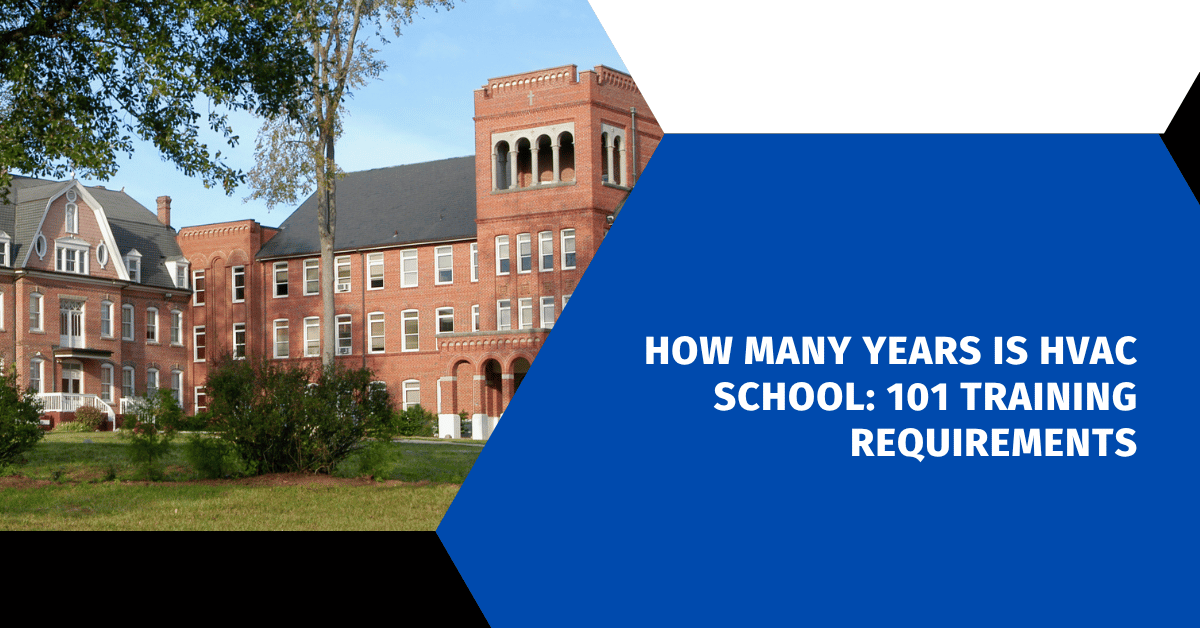Affiliate Disclosure
HVAC Guide Guys is a participant in the Amazon Services LLC Associates Program, an affiliate advertising program designed to provide a means for sites to earn advertising fees by advertising and linking to Amazon.
How Many Years Is HVAC School? Are you ready to start a rewarding career that keeps America’s indoor spaces comfy and efficient? Learning how many years HVAC school takes could be your first step. It leads to a dynamic technical job with exciting chances.

HVAC technicians are key to keeping our living and work spaces comfortable. The time you spend in HVAC school depends on your education path. You can choose from certificate programs to associate degree tracks.
The U.S. Bureau of Labor Statistics says HVAC jobs will grow 5% by 2031. This means there’s a strong need for skilled HVAC professionals who get quality education and training.
Key Takeaways
- HVAC training programs usually last from 6 months to 2 years
- There are many educational paths for future HVAC technicians
- Certification can boost your career and earnings
- Hands-on training is key for learning skills
- The HVAC industry offers great job chances
Table of Contents
Understanding HVAC Training Program Options
Choosing the right HVAC training program is key to your career success. The length of HVAC certification and the course timeline change based on the program. Each one has its own benefits, fitting different career goals and personal situations.
Aspiring HVAC technicians have many educational paths to follow. Your choice affects your professional growth, learning depth, and career chances.
Associate Degree Programs
An Associate in Applied Science (AAS) in HVAC offers deep training. These programs need two years of full-time study. They provide a detailed educational experience.
- Comprehensive technical knowledge
- Broader understanding of HVAC systems
- Potential for higher starting salaries
Certificate Programs
Certificate programs are a quicker way to start in HVAC. They last from 6 to 12 months. They focus on specific skills.
| Certificate Type | Credits | Typical Duration |
|---|---|---|
| Heating Certificate | 28 | 6-9 months |
| Air Conditioning Certificate | 31 | 7-10 months |
| Refrigeration Certificate | 29 | 6-9 months |
Specialized Certifications
Specialized certifications can boost your HVAC career. They show you’re an expert in certain HVAC areas. They add to your professional credibility.
“Continuous learning is the key to success in the HVAC industry.” – HVAC Industry Expert
Your career path depends on picking the right program. It should match your career goals and how you learn best.
How Many Years Is HVAC School: Duration Overview
Understanding how long HVAC school lasts is key for those thinking about a career in heating, ventilation, and air conditioning. The time you spend in HVAC school can change a lot based on the program you pick.
HVAC training programs usually last from 7 months to 2 years. How long you’ll be in school depends on a few important things:
- Program type (certificate vs. associate degree)
- Full-time or part-time study
- Your personal learning pace
- Specific school curriculum
Now, let’s look at the usual time frames for HVAC school:
| Program Type | Typical Duration | Total Hours |
|---|---|---|
| Certificate Program | 7-12 months | 600-900 hours |
| Associate Degree | 18-24 months | 1,200-1,800 hours |
| Apprenticeship | 3-5 years | 2,000-4,000 hours |
At places like Apex Technical School, you can finish an HVAC program in just 7 months. The most important thing is to pick a program that fits your career goals and schedule.
Shorter programs might focus more on basic skills. Longer programs give you more training. How fast you finish your HVAC education depends a lot on your effort and commitment.
Explore Our HVAC Shop
Looking for top-rated HVAC tools, parts, and accessories? Visit our shop and find the perfect solution for your needs.
Visit the ShopHVAC Program Course Content and Curriculum
Your HVAC education covers a wide range of topics. It’s designed to get you ready for a career in heating, ventilation, and air conditioning. You’ll learn both technical skills and industry standards that are key for success.
The HVAC degree length is substantial. It gives you a deep dive into technical areas. You’ll study subjects that prepare you for HVAC industry challenges.
Core Technical Skills
In your HVAC training, you’ll learn vital technical skills. These skills are the foundation of your career. You’ll master:
- Electrical system diagnostics
- Refrigeration system maintenance
- Heating system repair
- Air conditioning unit troubleshooting
- Climate control system installation
Theoretical Knowledge
You’ll also learn important theoretical concepts. These support your practical skills. Key areas include:
- Thermodynamics principles
- Energy efficiency concepts
- System design fundamentals
- Advanced refrigeration technologies
Safety Standards and Regulations
Learning safety protocols is a big part of HVAC education. You’ll get a full rundown on safety rules. These protect both technicians and clients.
| Safety Category | Key Learning Objectives |
|---|---|
| Personal Protection | Proper use of safety equipment |
| Equipment Handling | Safe manipulation of complex HVAC systems |
| Environmental Compliance | Understanding EPA regulations |
Your HVAC education will prepare you with the knowledge and skills to succeed in this vital industry.
Fast-Track HVAC Training Programs
If you’re eager to start your HVAC career, fast-track training is a great option. These programs pack a lot into a short time. They make learning more intense and focused.
These programs are perfect for those who are eager to learn. You can finish in just 7-10 months. This is much faster than the usual two years.
- Condensed curriculum covering essential technical skills
- Intensive hands-on training
- Quick entry into the job market
- Focused learning environment
These programs are great for:
- Those who want to start their career fast
- People with strong time management skills
- Individuals who can handle a lot of learning
- Those who need to balance work and school
Remember, fast-track programs need a lot of commitment and dedication. You’ll face a tough learning pace. It packs a lot into a short time.
“Speed doesn’t compromise quality when you’re fully committed to learning.” – HVAC Training Professional
Before picking an accelerated program, look into local technical schools. Make sure the curriculum meets industry standards. Your aim is to get the skills needed for a successful HVAC career.
Explore Our HVAC Shop
Looking for top-rated HVAC tools, parts, and accessories? Visit our shop and find the perfect solution for your needs.
Visit the ShopAssociate Degree vs. Certificate Programs: Time Comparison
Choosing the right HVAC educational path depends on your career goals and time availability. Understanding the hvac certification length and hvac course timeline can help you make an informed decision about your professional training.
Different HVAC training programs offer unique approaches to skill development. Your choice between an associate degree and a certificate program will impact your learning journey and future career prospects.
Two-Year Associate Degree Path
An Associate in Applied Science degree provides a thorough HVAC education. This program usually takes about two and a half years for full-time students. The longer time allows for deeper learning and broader skill development.
- Full program duration: 5 semesters
- Comprehensive technical training
- In-depth theoretical and practical knowledge
Certificate Program Timeline
Certificate programs offer a quicker way to start your HVAC training. They are perfect for those wanting to enter the workforce fast. Part-time students can finish their certification in about two years.
- Condensed curriculum
- Faster career entry
- Focused technical skills
“The right HVAC program can accelerate your career path and provide the skills needed for success in the industry.” – HVAC Training Expert
Your decision should balance time commitment, learning depth, and career objectives. Both paths offer valuable routes to becoming a skilled HVAC professional.
Hands-On Training Components
Practical experience is key to successful HVAC training. Your HVAC program will focus on hands-on learning. This turns theory into real skills. Technical schools offer training that gets you ready for the job.

In your HVAC program, you’ll do important practical training. This includes:
- Equipment installation simulations
- Diagnostic testing procedures
- System repair workshops
- Climate control technology practice
These practical experiences happen in labs with real tools. You’ll work directly with:
- Residential HVAC systems
- Commercial refrigeration units
- Advanced climate control technologies
| Training Component | Typical Duration | Skills Developed |
|---|---|---|
| Lab Workshops | 120-180 hours | System diagnostics |
| Equipment Installation | 90-150 hours | Practical setup techniques |
| Repair Simulations | 100-160 hours | Troubleshooting skills |
Hands-on training prepares you for HVAC challenges. It connects classroom learning to real-world skills.
Explore Our HVAC Shop
Looking for top-rated HVAC tools, parts, and accessories? Visit our shop and find the perfect solution for your needs.
Visit the ShopIndustry Certifications and Timeline Requirements
Earning professional certifications is key in your HVAC career. These credentials show your skills, make you more marketable, and show your dedication to excellence in HVAC.
HVAC pros can get many certifications that affect their career path. These certifications require training and specific knowledge. They vary in what you need to learn.
HVAC Excellence Certification
The ESCO Institute offers the HVAC Excellence certification. It’s a tough test of your technical skills. Here’s what you need to do:
- Finish specialized HVAC training programs
- Pass detailed written and practical exams
- Show you’re good at the core technical skills
- Keep up with ongoing professional growth
NATE Certification Process
NATE certification is the top honor in HVAC. To get it, you must:
- Finish formal HVAC education
- Get hands-on work experience
- Pass tests on specific HVAC knowledge
- Pick a certification track, like installation or service
The time it takes to get certified can be 6 months to 2 years. It depends on the certification and your experience. Getting these certifications can really help your career and pay in HVAC.
Career Opportunities After HVAC School
After finishing your HVAC training, you’ll find many exciting career paths. The skills you learn prepare you for stable and growing jobs. These opportunities are available in the HVAC industry.
Graduates often land promising jobs in several areas:
- HVAC Technician
- Installation Specialist
- Maintenance Technician
- Commercial HVAC Systems Technician
- Residential Comfort Systems Expert
Your training gives you technical skills that employers want. You can work in homes or big buildings. The Bureau of Labor Statistics says HVAC jobs will grow 5% by 2029.
Potential work places include:
- Construction companies
- Mechanical contractors
- Manufacturing facilities
- Government agencies
- Self-employed contracting
Pro tip: Keep learning and specialize during your training. This can boost your career and pay.
Explore Our HVAC Shop
Looking for top-rated HVAC tools, parts, and accessories? Visit our shop and find the perfect solution for your needs.
Visit the ShopCost and Duration Considerations

Understanding the cost of HVAC education is key. The length of your hvac degree affects how much you’ll spend on training. Knowing how program length and cost relate helps you choose wisely.
The time it takes to finish an HVAC program varies. Different paths have different costs:
- Certificate programs last 6-12 months
- Associate degrees take 2 years
- Specialized certifications can be shorter or more in-depth
Tuition Investment
Technical schools offer affordable HVAC training. Tuition varies from $3,000 to $15,000, based on the program. Shorter programs are often cheaper upfront.
Financial Aid Options
There are many ways to cover education costs:
- Federal student grants
- Vocational training scholarships
- Employer tuition reimbursement
- Low-interest student loans
“Investing in your HVAC education is an investment in a stable, high-demand career path.” – Industry Training Expert
Think about your finances and career goals when picking an HVAC program. Finding the right mix of duration, cost, and quality is essential for success.
Program Flexibility and Schedule Options
Understanding your HVAC course timeline is easier with the right scheduling options. Many programs know students have different lives and offer flexible learning paths. This way, they can meet various needs.
The time it takes to finish your HVAC program depends on your schedule. You can choose from several options:
- Full-time daytime classes
- Part-time evening classes
- Weekend intensive programs
- Online and hybrid learning modules
Working people often like part-time or evening classes. These allow them to keep their jobs while learning. Even though it might take longer, it’s great for those with lots to do.
| Program Type | Typical Duration | Flexibility Level |
|---|---|---|
| Full-Time Day Program | 12-18 months | Low |
| Part-Time Evening Program | 18-24 months | High |
| Online Hybrid Program | 15-20 months | Very High |
Today’s HVAC training programs know flexibility is key for success. They offer many scheduling options. This way, anyone can get the technical education they want, no matter their personal situation.
Explore Our HVAC Shop
Looking for top-rated HVAC tools, parts, and accessories? Visit our shop and find the perfect solution for your needs.
Visit the ShopSkills Development Timeline
Your HVAC training journey is carefully planned. It turns you from a beginner to a skilled worker. The time it takes can be from 6 months to 2 years, based on your education choice.
In the early stages, you’ll learn the basics. You’ll understand system parts, electrical basics, and refrigeration. Your learning will progress like this:
- First 3-6 months: Basic technical concepts
- 6-12 months: Intermediate system diagnostics
- 12-24 months: Advanced installation and repair techniques
Learning in HVAC combines classroom and hands-on training. You’ll grow your skills through:
- Theoretical instruction
- Laboratory simulations
- Hands-on apprenticeship experiences
Your skills will match what the industry needs. This prepares you for HVAC challenges in real life.
| Training Phase | Key Skills Developed | Duration |
|---|---|---|
| Foundation | Basic system understanding | 3-6 months |
| Intermediate | Diagnostic capabilities | 6-12 months |
| Advanced | Complex repair and installation | 12-24 months |
Remember, skill development in HVAC is an ongoing process that continues well beyond formal education.
Conclusion
Knowing how long HVAC school lasts is key to planning your career. HVAC training can take anywhere from 7 months to 2.5 years. This depends on the program you choose and your goals.
When looking at HVAC apprenticeships, each path has its own benefits. You might choose a certificate, associate degree, or specialized certification. Learning technical skills is essential, and your education will greatly benefit your career.
Your success in HVAC isn’t just about how long you train. It’s about mastering technical skills and keeping up with new technologies. Research different programs and pick one that fits your career goals. The right education will prepare you for success in this important field.
FAQ
How long does it typically take to complete an HVAC training program?
What are the different types of HVAC training programs available?
Is a certificate program or an associate degree better for my HVAC career?
Do I need certifications in addition to my HVAC training?
How much hands-on training is included in HVAC programs?
Can I complete HVAC training while working full-time?
What is the fastest way to become an HVAC technician?
How much does HVAC training typically cost?
How long does it typically take to complete an HVAC training program?
What are the different types of HVAC training programs available?
Is a certificate program or an associate degree better for my HVAC career?
Do I need certifications in addition to my HVAC training?
How much hands-on training is included in HVAC programs?
Can I complete HVAC training while working full-time?
What is the fastest way to become an HVAC technician?
How much does HVAC training typically cost?
FAQ
How long does it typically take to complete an HVAC training program?
HVAC training program lengths vary. Certificate programs last 6-12 months. Associate degree programs take 2 years. Apprenticeships, which mix work and class, can last 3-5 years.
What are the different types of HVAC training programs available?
You can choose from several HVAC training paths. These include certificate, associate degree, apprenticeship, and online or hybrid programs. Each offers different levels of education and career readiness.
Is a certificate program or an associate degree better for my HVAC career?
Your career goals determine the best choice. Certificate programs are quicker, lasting 6-12 months. Associate degrees take 2 years and may lead to better career growth.
Do I need certifications in addition to my HVAC training?
Certifications like NATE and HVAC Excellence are not always required but boost your skills. They require passing exams and extra training after your initial education.
How much hands-on training is included in HVAC programs?
HVAC programs include a lot of hands-on training, 40-50% of the total time. This includes lab work, job simulations, and practical skills to prepare you for real HVAC jobs.
Can I complete HVAC training while working full-time?
Yes, many programs offer flexible schedules. This includes part-time, evening, and online classes. Apprenticeships are great for working people, combining work and class.
What is the fastest way to become an HVAC technician?
Fast-track programs can be finished in 6-9 months. They focus on essential skills to get you working fast. But, they require intense study and dedication.
How much does HVAC training typically cost?
Prices vary from
FAQ
How long does it typically take to complete an HVAC training program?
HVAC training program lengths vary. Certificate programs last 6-12 months. Associate degree programs take 2 years. Apprenticeships, which mix work and class, can last 3-5 years.
What are the different types of HVAC training programs available?
You can choose from several HVAC training paths. These include certificate, associate degree, apprenticeship, and online or hybrid programs. Each offers different levels of education and career readiness.
Is a certificate program or an associate degree better for my HVAC career?
Your career goals determine the best choice. Certificate programs are quicker, lasting 6-12 months. Associate degrees take 2 years and may lead to better career growth.
Do I need certifications in addition to my HVAC training?
Certifications like NATE and HVAC Excellence are not always required but boost your skills. They require passing exams and extra training after your initial education.
How much hands-on training is included in HVAC programs?
HVAC programs include a lot of hands-on training, 40-50% of the total time. This includes lab work, job simulations, and practical skills to prepare you for real HVAC jobs.
Can I complete HVAC training while working full-time?
Yes, many programs offer flexible schedules. This includes part-time, evening, and online classes. Apprenticeships are great for working people, combining work and class.
What is the fastest way to become an HVAC technician?
Fast-track programs can be finished in 6-9 months. They focus on essential skills to get you working fast. But, they require intense study and dedication.
How much does HVAC training typically cost?
Prices vary from $1,200 for short programs to $10,000-$30,000 for degrees. Many students use financial aid, scholarships, and employer help to cover costs.
What are the ongoing education requirements for HVAC professionals?
HVAC professionals must keep learning due to new technologies. They often take ongoing training, recertification, and specialized courses to stay updated.
Are online HVAC training programs as effective as in-person programs?
Online and hybrid programs work well for theory. But, hands-on training is key in HVAC. Look for programs that mix online learning with in-person training for a well-rounded education.
,200 for short programs to ,000-,000 for degrees. Many students use financial aid, scholarships, and employer help to cover costs.
What are the ongoing education requirements for HVAC professionals?
HVAC professionals must keep learning due to new technologies. They often take ongoing training, recertification, and specialized courses to stay updated.
Are online HVAC training programs as effective as in-person programs?
Online and hybrid programs work well for theory. But, hands-on training is key in HVAC. Look for programs that mix online learning with in-person training for a well-rounded education.

